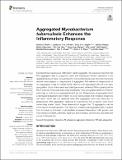| dc.contributor.author | Rodel, Hylton E | |
| dc.contributor.author | Ferreira, Isabella ATM | |
| dc.contributor.author | Ziegler, Carly GK | |
| dc.contributor.author | Ganga, Yashica | |
| dc.contributor.author | Bernstein, Mallory | |
| dc.contributor.author | Hwa, Shi-Hsia | |
| dc.contributor.author | Nargan, Kievershen | |
| dc.contributor.author | Lustig, Gila | |
| dc.contributor.author | Kaplan, Gilla | |
| dc.contributor.author | Noursadeghi, Mahdad | |
| dc.contributor.author | Shalek, Alex K | |
| dc.contributor.author | Steyn, Adrie JC | |
| dc.contributor.author | Sigal, Alex | |
| dc.date.accessioned | 2022-03-18T14:28:26Z | |
| dc.date.available | 2022-03-18T14:28:26Z | |
| dc.date.issued | 2021 | |
| dc.identifier.uri | https://hdl.handle.net/1721.1/141285 | |
| dc.description.abstract | <jats:p><jats:italic>Mycobacterium tuberculosis</jats:italic> (Mtb) bacilli readily aggregate. We previously reported that Mtb aggregates lead to phagocyte death and subsequent efficient replication in the dead infected cells. Here, we examined the transcriptional response of human monocyte derived macrophages to phagocytosis of aggregated Mtb relative to phagocytosis of non-aggregated single or multiple bacilli. Infection with aggregated Mtb led to an early upregulation of pro-inflammatory associated genes and enhanced TNFα signaling via the NFκB pathway. These pathways were significantly more upregulated relative to infection with single or multiple non-aggregated bacilli per cell. Phagocytosis of aggregates led to a decreased phagosome acidification on a per bacillus basis and increased phagocyte cell death, which was not observed when Mtb aggregates were heat killed prior to phagocytosis. Mtb aggregates, observed in a granuloma from a patient, were found surrounding a lesion cavity. These observations suggest that TB aggregation may be a mechanism for pathogenesis. They raise the possibility that aggregated Mtb, if spread from individual to individual, could facilitate increased inflammation, Mtb growth, and macrophage cell death, potentially leading to active disease, cell necrosis, and additional cycles of transmission.</jats:p> | en_US |
| dc.language.iso | en | |
| dc.publisher | Frontiers Media SA | en_US |
| dc.relation.isversionof | 10.3389/fmicb.2021.757134 | en_US |
| dc.rights | Creative Commons Attribution 4.0 International license | en_US |
| dc.rights.uri | https://creativecommons.org/licenses/by/4.0/ | en_US |
| dc.source | Frontiers | en_US |
| dc.title | Aggregated Mycobacterium tuberculosis Enhances the Inflammatory Response | en_US |
| dc.type | Article | en_US |
| dc.identifier.citation | Rodel, Hylton E, Ferreira, Isabella ATM, Ziegler, Carly GK, Ganga, Yashica, Bernstein, Mallory et al. 2021. "Aggregated Mycobacterium tuberculosis Enhances the Inflammatory Response." Frontiers in Microbiology, 12. | |
| dc.contributor.department | Ragon Institute of MGH, MIT and Harvard | |
| dc.contributor.department | Massachusetts Institute of Technology. Department of Chemistry | |
| dc.contributor.department | Massachusetts Institute of Technology. Institute for Medical Engineering & Science | |
| dc.contributor.department | Koch Institute for Integrative Cancer Research at MIT | |
| dc.relation.journal | Frontiers in Microbiology | en_US |
| dc.eprint.version | Final published version | en_US |
| dc.type.uri | http://purl.org/eprint/type/JournalArticle | en_US |
| eprint.status | http://purl.org/eprint/status/PeerReviewed | en_US |
| dc.date.updated | 2022-03-18T14:20:45Z | |
| dspace.orderedauthors | Rodel, HE; Ferreira, IATM; Ziegler, CGK; Ganga, Y; Bernstein, M; Hwa, S-H; Nargan, K; Lustig, G; Kaplan, G; Noursadeghi, M; Shalek, AK; Steyn, AJC; Sigal, A | en_US |
| dspace.date.submission | 2022-03-18T14:20:47Z | |
| mit.journal.volume | 12 | en_US |
| mit.license | PUBLISHER_CC | |
| mit.metadata.status | Authority Work and Publication Information Needed | en_US |
